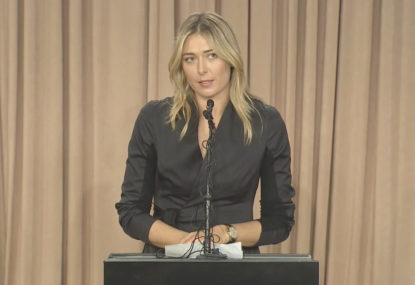'An iconic roster': LeBron, Steph, KD headline all-star cast for Team USA's shot at Olympic glory
LeBron James is going back to the Olympics for the first time in 12 years. Steph Curry is headed to the games for the…

With athletes increasingly doping via doctors’ prescription rather than supposed rogue labs or dodgy campus chemists, Rio may go down as the first ‘Dr-oping’ Olympics.
How much the once-lauded therapeutic use exemption system has contributed to this prospect is unclear, but it seems the GP pharmacy handbook has a page for any sportsman who can present with a ‘condition’.
Maria Sharapova’s presenting symptoms were seemingly as uncomplicated as fatigue and a family history of diabetes. She might well have said “a family history of fatigue from sporting exertion”, so unspecified now seem the grounds for a script.
Since Maria’s widely hailed prompt and classy admission, a handful of others have also been sanctioned for Meldonium use, notably Rio 100m Breaststroke favourite Yolia Efimova.
It should be noted that this drug only became prohibited this year.
Yolia seems to have had a busy few years on the prescription and supplement circuit, since she hadn’t long been back in the pool after a 16-month ban for steroid use. And yes, she’s Russian. Some are predicting a life ban for her.
Meldonium isn’t the only abused drug intended for ischema-damaged hearts and the frail elderly. London swimming gold medallist Sun Yang was caught using the similarly acting Trimetazidine (TMT) and served a controversially brief ban in China.
His minders even defended Yang’s usage by claiming he was once diagnosed with a significant heart problem.
With such drugs designed primarily for those with relatively few years to live, it would not be surprising if long term side effects were given a low funding priority.
Therefore, it should be of concern that a cohort assumed to be among the most vital and healthy people on the planet – elite sportsmen – might one day pay dearly for their choices. It reminds me of ’70s East German athletes, many of whom are now either dead or in very poor health.
With WADA’s cautious pace in adding abused medicines to its ‘totally prohibited’ list (at least a decade wait in Meldonium’s case), the alarm bells should be ringing.
One wonders how many Rio gold medals will be won by athletes with years of advantage in actual race performance and training recovery via therapeutic use prescriptions for medications in WADA’s current ‘monitored’ list (the typical precursor to banning).
Once upon a time, if your child was super-talented in both sport and music, you might have gently nudged them toward a sporting career, since music seemed to have a drug problem.
But the relative longevity of some of pop music’s greats suggests recreational, mind-altering drugs are not necessarily life shortening. I’m not sure anyone is predicting the same benign outcome for sport’s current ‘body-altering’ drugs.